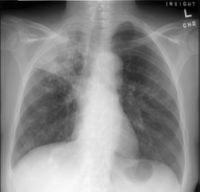Tuberculosis
Tuberculosis, also known as "TB" or "consumption", is a multi-system disease caused by the organism Mycobacterium tuberculosis.
Contents
Epidemiology
Approximately one-third of the world population is infected with TB at any given time, with approximately 3 million TB-related deaths per year worldwide.
People with AIDS, cancer, malnutrition, chemotherapy, drug or alcohol abuse are especially susceptible to developing active TB. The risk of infection is also related to the patient's genetics, with some groups of blood antigens offering partial immunity. TB rates and deaths are greatest in the developing world, and TB is one of the leading causes of death in people infected with HIV. In the United States, TB rates increased during the early years of the HIV epidemic, but have since declined, and are in fact the lowest they have been since surveillance began in 1953. However, TB still affects tens of thousands of Americans, and kills several hundred per year. Antibiotic-resistant TB is a major problem in states with high levels of immigration from Eastern Europe, since these strains are particularly common in these countries.
Natural History
Tuberculosis can affect any organ in the body, but the primary disease is in the lungs. TB is spread by aerosols produced by coughing, or by prolonged contact with someone with active pulmonary TB. This most often occurs in household contacts, or in people who work with an infected person in a workplace with poor ventilation.
- Latent TB: In most people, especially those who have a normal immune system, after becoming infected, the body controls the illness. They have no symptoms, and are not contagious. Signs of illness can be a positive TB test or typical changes on X-rays of the chest. The TB bacteria survive in "nodules" during this latent infection, in tissues such as the lungs, liver and lymph nodes. In a small, but significant, percentage of people, latent TB can "reactivate" and make the person ill. Therefore, most people with latent TB are treated to eliminate the infection.
- Active TB: In some people, the initial infection can make them ill, in others, latent TB reactivates and makes them ill. In pulmonary tuberculosis the usual symptoms are cough for longer than three weeks, bloody sputum, fevers, night sweats, and weight loss. At this stage, the disease is very contagious, and is likely to be fatal within two to three months if not treated.
Treatment
Latent TB is usually treated fairly easily with one to two types of antibiotics, depending on local resistance patterns. The treatment often lasts up to a year, since the nodules surrounding the bacteria protect them from antibiotics in the bloodstream.
Active TB usually requires hospitalization and treatment with multiple medications. Given that the treatment regimen is lengthy and complicated, Directly Observed Therapy (DOT) is often recommended. There have been many legal and ethical issues involving involuntary isolation of non-compliant patients with active TB.
Multi Drug Resistant TB (MDR-TB): Certain geographical areas have seen rises in "MDR-TB". This is especially a problem when patients are intermittently-compliant with their therapy, as the bacteria develops drug-resistance. These drug-resistant strains are also more virulent and spread rapidly.
Etymology
The word tuberculosis derives from the Latinate tuberculum, meaning root vegetable (French tubercule, Spanish and Portuguese tubérculo, Italian tubero). The disease primarily afflicted poor people, who had a diet reliant on cheap root vegetables such as potatoes and turnips, so it was mistakenly thought the disease was harbored in such vegetables. It is now known that the squalor of poverty simply created unsanitary conditions that fostered the spread of the disease.
Historical figures who died of Tuberculosis
- Anders Celsius. Scientist and Inventor
- David Brainerd, theologian
- Frederic Chopin, composer
- Franz Kafka, writer
- "Doc" Holliday, dentist and gunslinger
- John Calvin, religious figure
- Edward Bellamy, Author
See also
References
- https://www.cdc.gov
- Mandell, Douglas and Bennett's Principles and Practice of Infectious Diseases, Chirchill Livingstone.

